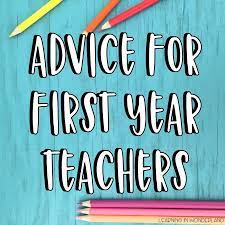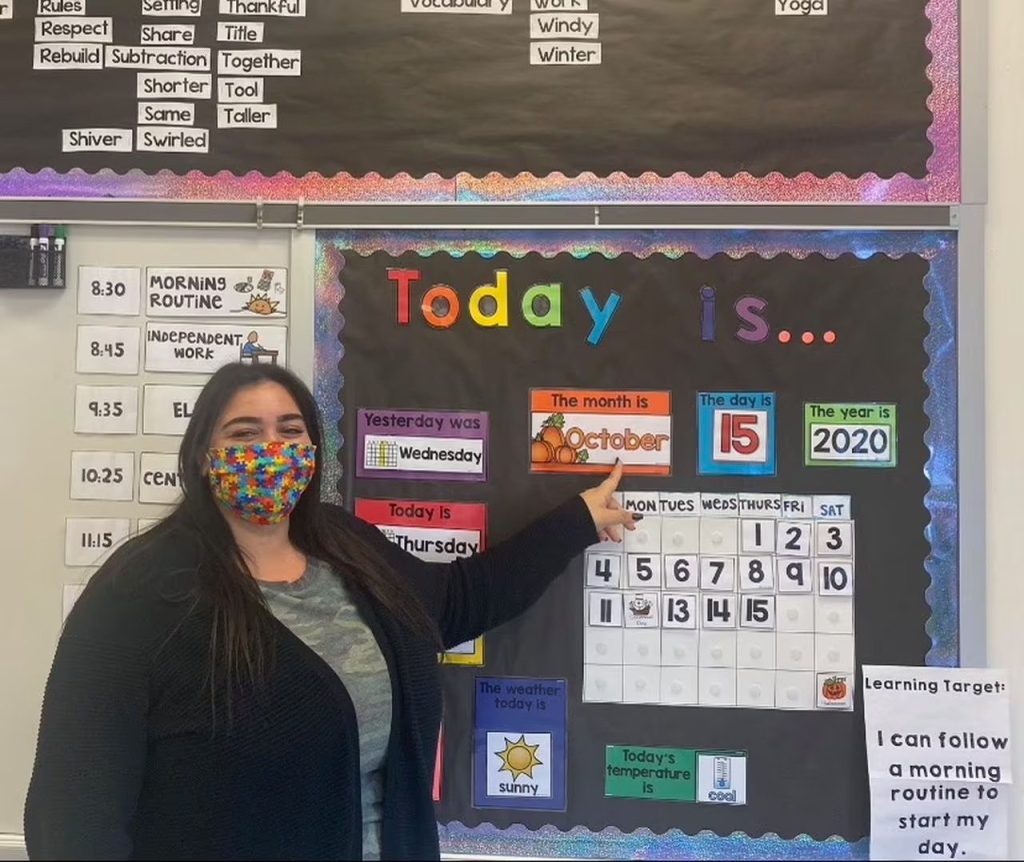The first year of teaching can be a thrilling and challenging experience for new educators. As rookies in the field, they are eager to make a difference but may also confront various hurdles that they didn’t anticipate during their training. Here are several pieces of advice to help first-year teachers navigate their initial year at the helm of the classroom:
1. Build Relationships: Getting to know your students is foundational to a successful classroom environment. Learn their names quickly, show interest in their lives, and establish trust. This connection with students often translates into better engagement and respect.
2. Plan Thoroughly but Be Flexible: While having detailed lesson plans is essential, it’s equally important to adapt when things don’t go as expected. Be ready to modify your plans based on students’ understanding or unforeseen circumstances.
3. Seek Mentorship: Don’t hesitate to ask for help or advice from experienced colleagues. Find a mentor who can provide you with guidance, support, and feedback – it makes all the difference.
4. Set Clear Expectations: From the start, establish clear rules and routines for your classroom. Consistent enforcement of these rules helps maintain order and ensures all students know what is expected of them.
5. Take Care of Yourself: Teaching is an intensive job, and burnout can happen quickly if you’re not careful. Prioritize self-care by getting enough rest, exercising, eating well, and finding time for hobbies and relaxation.
6. Reflect on Your Practice: Regularly spend time reflecting on your teaching methods, what’s working well and what isn’t. This self-assessment will guide your professional growth and improve your teaching efficacy.
7. Stay Positive: Stay focused on the positives amid challenges. Celebrate even the small victories; these moments help keep your spirits up and motivate you to continue making a difference.
8. Embrace Professional Development: Attend workshops, conferences, or pursue further education to stay abreast of new teaching strategies and developments in education.
Remember that every experienced teacher was once a beginner too; with perseverance, passion, and dedication to continuous improvement, the first year can lay down a robust foundation for an impactful teaching career.
First Year Teacher Must Haves What The Veterans Wish Someone Told Them
As the bell rings on that first day of school, a symphony of anticipation, nerves, and excitement fills the air, particularly for first-year teachers gearing up for their inaugural class. Stepping into the classroom for the first time is a monumental milestone in an educator’s career, but it’s not without its challenges. Experienced teachers often reflect on their early years and recognize that a few key items and pieces of wisdom would have made a world of difference. Now, those same veterans are sharing their insight to equip new teachers with must-have tools for their educational journey.
Firstly, a well-organized planner is indispensable. Lesson planning is the cornerstone of teaching, and having a reliable planner can help maintain an organized schedule and keep track of grading, meetings, and important deadlines.
Moreover, a stock of classroom supplies that go beyond the basics provided by the school is critical. This includes items like extra pens and pencils, markers, sticky notes, and various kinds of paper. A personal laminator can also be invaluable for preserving frequently used documents and instructional materials.
Another key item is a comfortable pair of shoes. Teachers are on their feet most of the day, and supportive footwear can prevent fatigue and discomfort.
Veteran teachers also stress the importance of self-care products being readily available. This includes having a stash of snacks for those long afternoons, a water bottle to stay hydrated, and basic first-aid supplies for minor emergencies.
Technology also plays a significant role in modern education. A personal laptop or tablet can provide flexibility in lesson planning and presentation as well as record-keeping and communication with parents and administrators.
A collection of professional development books can be beneficial as well. These books can offer strategies for classroom management, instructional techniques, or simply provide encouragement on tough days.
Importantly, creating an inviting classroom environment enhances learning experiences; hence, décor that stimulates an engaging atmosphere is pivotal—an array of posters highlighting inspirational quotes or subject-related facts aids educational enrichment.
Finally yet importantly are personal touches that show your personality and make the space welcoming – family photos or plants can make your classroom feel like home.
Armed with these must-haves from seasoned professionals’ treasure trove of knowledge, first-year teachers are more prepared to navigate the uncharted waters of their initial teaching experience with confidence. Not everything will go as planned that first year—but with these items at one’s disposal—a significant amount of unforeseen challenges can be mitigated, leaving more room to focus on what matters most: educating young minds.
18 First Day of School Books Teachers Swear By + Complementary Activities
Going back to school can be an exciting yet nerve-wracking time for students of all ages. Teachers often use books to help ease this transition, and some titles have become beloved staples in the classroom. Here’s a list of 18 first-day-of-school books teachers love, along with complementary activities that can be integrated into the curriculum to make the first days engaging and educational.
1. “First Day Jitters” by Julie Danneberg – Teachers can start a discussion about feelings on the first day of school and have students draw their emotions.
2. “The Kissing Hand” by Audrey Penn – After reading, students can create handprint art and discuss their family traditions.
3. “Wemberly Worried” by Kevin Henkes – A great way to explore worries and comforting techniques, culminating in creating a “Worry Wall”.
4. “The Night Before Kindergarten” by Natasha Wing – Kids can write a letter to their kindergarten self reflecting what they have learned.
5. “School’s First Day of School” by Adam Rex – Hold a classroom camera tour, letting students take pictures of their new environment from the perspective of the school building.
6. “Chrysanthemum” by Kevin Henkes – A name study activity would complement this book well; every student could research the meaning and origin of their name.
7. “Miss Bindergarten Gets Ready for Kindergarten” by Joseph Slate – Create an alphabet activity where students match letters with objects or actions related to school.
8. “The Name Jar” by Yangsook Choi – Start a multicultural discussion and have each child introduce their name and its story.
9. “Llama Llama Misses Mama” by Anna Dewdney – A group collage of favorite things about school can foster discussions about being away from home.
10. “How I Spent My Summer Vacation” by Mark Teague – Invite students to present a short story or picture diary of their summer vacation.
11. “David Goes To School” by David Shannon – Discuss classroom rules, then have children create posters illustrating them.
12. “Pete the Cat: Rocking in My School Shoes” by Eric Litwin – Have a shoe-themed music and movement activity where kids sing about their own school shoes.
13. “My Teacher’s Secret Life” by Stephen Krensky – Classmates could interview each other about what they imagine their lives are like outside of school.
14. “A Bad Case of Stripes” by David Shannon – Use this book to explore themes of self-esteem and individuality through an art project using different patterns and colors.
15. “If You Take a Mouse to School” by Laura Numeroff – Set up a sequence activity based on cause-and-effect scenarios.
16. “The Day You Begin” by Jacqueline Woodson – Could lead to writing personal narratives about unique experiences that each student has had.
17. The Magic School Bus at the Waterworks” by Joanna Cole – Perfect for science-based activities exploring water cycles or creating simple water experiments.
18. “Too Much Glue” by Jason Lefebvre – After reading, engage in a sensory play activity using glue and crafting materials, tapping into creativity while discussing moderation and limits.
These titles not only prepare children for the academic year ahead but also cater to the emotional side of entering a new grade or school environment through stories they can relate to and learn from. Including activities associated with these books further enhances student involvement and creates a memorable beginning to the school year.
I’m Getting a Student Teacher, and I’m Scared I’ll Break Her
Introduction
The prospect of having a student teacher in the classroom for the first time can be a heart-thumping mixture of excitement and fear. Emotions run high, as the responsibility of guiding an aspiring teacher’s journey lies on your shoulders. Holding the key to their successful transition from academia to the real world of teaching, there’s no denying that the pressure feels immense. There may be times where doubts creep in, and you wonder if you’re adequately prepared to mentor this burgeoning professional without breaking them in the process.
Understanding Your Role: Mentorship is Key
As an experienced educator, it is essential to understand your role in guiding a student teacher through this critical phase. You have undisputed knowledge and invaluable insights into navigating the challenges that come with managing a classroom. It is crucial not to underestimate these skills, but simultaneously be aware that every student teacher comes with their unique aspirations and strengths. The task at hand is understanding each other’s expectations, offering guidance when needed, and becoming an open vault for questions or concerns.
Open Communication
One of the most vital aspects of any mentor-mentee relationship is open communication. Honesty and transparency create a safe space for both parties to share vulnerabilities and express themselves freely. By being approachable and a good listener, you encourage your student teacher to voice their doubts or provide feedback without fear of disappointment or disapproval.
Fostering Independence: Let Them Fly
Although it is critical to remain present as a guiding force, it is equally important not to hover like a helicopter over their every move. Give your student teacher plenty of opportunities to lead lessons, create lesson plans, manage student behavior, and foster relationships with students independently. Gradually increase their responsibilities without overwhelming them, which will nurture self-confidence within their abilities as they navigate various roles within the classroom.
Providing Constructive Feedback
Effective feedback is essential in supporting the growth of your student teacher. Be sure to provide structured, well-timed, and specific feedback that will effectively address areas where they can improve. Recognize their progress and celebrate small victories, as this will encourage them to challenge themselves further and build their resilience.
Self-Care for Mentor and Mentee
Finally, do not forget the importance of prioritizing your well-being as a mentor, alongside supporting the self-care of your student teacher. It can be daunting and demanding for both parties, but showing mutual compassion will foster a healthy mentor-mentee relationship. Acknowledge that neither of you is perfect and ensure that you maintain a healthy work-life balance by taking breaks when needed.
Conclusion
The journey of mentoring aspiring teachers is as rewarding as it is challenging. Embrace the opportunity as a chance to reflect on your practice, learn new perspectives, and ultimately transform two lives: yours and your mentee’s. Embrace the ups and downs, know that mistakes will happen on both sides, but with patience, trust, and empathy at the core – you can facilitate their growth into a flourishing educator without breaking them along the way.
Dear First Year Administrator
Introduction:
Starting your journey as a first-year administrator presents an incredible opportunity for personal and professional growth. As a new administrator, you will be faced with challenges and rewards unlike any other position in education. This article highlights advice and insights to help you embrace your role and thrive in your new environment.
1. Cultivate relationships and build trust:
The foundation of successful leadership in any organization is building strong, positive relationships with your colleagues and support staff. Take the time to get to know each individual’s strengths, aspirations, and challenges. By understanding the unique talents and perspectives of each member of your team, you will foster a strong sense of trust, commitment, and collaboration.
2. Communicate openly and transparently:
Effective communication is integral to navigating the world of administration. Keep an open line of communication with all members of your team by providing clear expectations, delivering constructive feedback, and addressing concerns in a timely manner. Remember that fostering open communication is an ongoing process that requires consistent effort.
3. Embrace mentorship and seek guidance:
Recognize that you do not need to have all the answers right away. Reach out to experienced administrators for guidance, advice, and support as you transition into your new role. Establishing a mentorship relationship can offer invaluable knowledge gained from their years of experience.
4. Make data-driven decisions:
Ensure the decisions you make are based on relevant data that objectively demonstrates the impact on student learning outcomes or staff performance metrics. By doing so, you can ensure that policies are strategic, targeted to areas of improvement, and grounded in evidence-based practices.
5. Engage with the wider school community:
In addition to forging strong relationships within your organization’s walls, consider reaching out to parents, community organizations, local businesses, and other external stakeholders who can contribute valuable knowledge, resources, or skills to support school success.
6. Pursue ongoing professional development:
Stay informed with the latest trends, research, and strategies in education administration by attending conferences, reading publications, and participating in professional learning communities. Emphasize the importance of continuous learning for yourself and your staff to foster a culture of improvement.
7. Foster a positive school culture:
As an administrator, you have the responsibility to set the tone for your school community. Displaying professionalism, empathy, and respect in all interactions will promote a supportive environment where students and staff feel empowered to pursue their goals.
8. Reflect on your experiences:
Make reflection an intentional practice as you navigate your first year in administration. Schedule time each week to reflect on successes, challenges, and areas for improvement, applying insights gained to inform your growth as a leader.
Conclusion:
Embarking on your first year as an administrator can be both exciting and challenging. By focusing on cultivating relationships, fostering transparency in decision-making, engaging with mentors and external stakeholders, staying current with professional development opportunities, and building a positive school culture, you will be well-positioned to rise above those challenges and lead with passion and confidence.
Give Your First-Year Teachers Everything They Need to Succeed
Introduction:
The success of a school largely depends on the quality of its teaching staff. As school administrators, it’s crucial to support your first-year teachers, providing them with everything they need to confidently perform in their new roles and ultimately achieve success. In this article, we will discuss essential strategies and resources to help first-year teachers excel in their careers.
1. Provide Comprehensive Orientation and Training Programs:
Begin with a thorough orientation program that introduces the first-year teachers to the school culture, policies, and expectations. These programs should cover essential aspects such as classroom management, lesson planning, grading systems, assessment methods, and parent interactions. Providing professional development workshops can further equip new teachers with updated teaching strategies and techniques.
2. Assign Effective Mentors:
Set up each first-year teacher with an experienced mentor who can offer guidance, support, and valuable insights throughout the school year. A good mentor will boost the confidence of a new teacher by sharing their own experiences, passing along resources and ideas, and offering constructive feedback on classroom performance.
3. Create Professional Learning Communities:
Encourage collaboration among teachers by setting up professional learning communities (PLCs) where they can share ideas, strategies, and experiences. PLCs foster a supportive environment that enables first-year teachers to benefit from the collective wisdom of their peers.
4. Monitor Progress And Provide Regular Feedback:
Conduct regular classroom observations for first-year teachers followed by constructive feedback sessions focusing on areas of improvement. These observations provide valuable insights into their teaching style and help track progress while offering suggestions for enhancement.
5. Encourage Reflection And Self-Assessment:
Encourage new teachers to reflect on their performance by engaging in activities such as journaling or creating a teaching portfolio. Reflective practices help identify areas for improvement, set goals, and track progress over time.
6. Offer Emotional Support And Resources:
The transition into the teaching profession can be overwhelming for many new educators. Assure them it is okay to make mistakes and remind them of their value as a teacher. Providing emotional support through access to mental health resources, including employee assistance programs and counseling services, can help reduce stress and prevent burnout.
7. Provide Adequate Supplies And Technology:
Equip first-year teachers with the necessary resources and technology they need to create a vibrant, engaging classroom environment. This includes access to teaching materials, textbooks, online resources, and tools that support differentiated learning styles.
Conclusion:
The success of your first-year teachers is crucial for their long-term job satisfaction, effectiveness, and retention within your school. By providing comprehensive training, strong mentorship, collaborative environments, regular feedback, reflection opportunities, emotional support, and necessary resources, you can set up your new teachers to thrive in their careers. This investment will ultimately benefit the students they serve and contribute to the overall success of the school.
Somebody Should Have Told Me: What First-Year Teachers Need to Know
Introduction:
As a first-year teacher, stepping into a classroom for the very first time can be both exhilarating and terrifying. Despite all the education, training, and support you may have received prior to this moment, there are some things you just don’t learn until you’re in the trenches. In this article, we will explore some essential tips that every first-year teacher should know.
1. Build strong relationships:
Establishing strong relationships with your students, their parents/guardians, your colleagues, and school administration is crucial for a successful first year. Remember that everyone has their own story and may be facing challenges you’re unaware of. Being empathetic, understanding, and supportive can make a significant difference in cultivating positive connections.
2. Embrace flexibility:
Although it’s important to have lesson plans and follow a structure, it’s equally essential to embrace flexibility. You will often have to adjust your plans on the fly due to unforeseen events or varying student needs. Being adaptable will help you navigate through these situations more smoothly.
3. Set clear expectations:
From day one, make sure to establish clear expectations for behavior and academic performance. Always communicate these expectations clearly to your students and be consistent in enforcing them. Remember that students may need occasional reminders; consistency is key.
4. Stay organized:
Being organized is vital to your success as a teacher. Keep track of lesson plans, student work, attendance records, and any other paperwork that comes your way. Establish weekly routines (such as grading or planning) and stick to them as closely as possible.
5. Seek mentorship:
Look for opportunities to connect with other teachers and seek their guidance on best practices or coping strategies for difficult situations. Many schools have mentorship programs or professional development workshops available – take advantage of these resources.
6. Prioritize self-care:
Teaching is a demanding job, both physically and emotionally. Make sure to prioritize self-care by setting aside time for yourself, staying active, eating well, and getting plenty of rest. Maintaining a healthy work-life balance is crucial to avoiding burnout.
7. Reflect on your daily experiences:
Take time each day to reflect on your experiences in the classroom. Analyze situations that went well, and those that did not. Identify areas for improvement, celebrate your successes, and learn from any mistakes or challenges you faced.
8. Don’t be too hard on yourself:
Last but not least, remember that you are only human. No teacher is perfect, especially in their first year! Expect challenges along the way but don’t be too harsh on yourself when things don’t go as planned. Observe your growth over time and focus on progress rather than perfection.
In conclusion, embarking on a first-year teaching journey will inevitably come with its own set of unique challenges. By implementing these strategies – building strong relationships, embracing flexibility, setting clear expectations, staying organized, seeking mentorship, prioritizing self-care, reflecting on daily experiences, and not being too hard on yourself – newly-minted teachers can set themselves up for a successful first year in the classroom.
35 Teachers Told Us What They Were Most Afraid Of Their First Year
Introduction:
The first year of teaching can be a rollercoaster of emotions, as new teachers face a myriad of challenges and triumphs in the classroom. Some fears stem from uncertainties, managing classroom dynamics, or even concerns about how to connect with their students. To gain a better understanding of the experiences and insights of those who have come before them, we asked 35 teachers what they were most afraid of during their first year. Here’s what they had to say.
1. Losing control of the classroom.
2. Not understanding the curriculum well enough.
3. Having parents question my authority or knowledge.
4. Failing to connect with students on a personal level.
5. Struggling with time management and organization.
6. Not knowing how to properly support students with special needs.
7. Being judged or criticized by colleagues for my teaching methods.
8. Having ineffective communication with parents.
9. Managing behavior issues in the classroom without losing my cool.
10. Failing to keep students engaged and interested in material.
11. Finding out that one of my students was being bullied or struggling with mental health issues.
12. Struggling to create an inclusive classroom environment for diverse learners.
13. Worrying about performance evaluations and job security.
14. Facing high expectations without adequate support from administration.
15. Navigating delicate relationships with coworkers and staff members.
16. Dealing with the pressure of standardized testing.
17. Adapting lesson plans to address various learning styles and needs within the classroom.
18. Feeling overwhelmed by paperwork and grading responsibilities.
19. Questioning whether I had chosen the right profession after all!
20. Wondering if I would ever have real “teacher voice” or command respect from students.
21. Juggling personal life, work-life balance, and self-care while working long hours.
22. Overcoming the fear of public speaking in front of a classroom.
23. Keeping up with ever-changing educational standards, trends, and policies.
24. Balancing discipline and maintaining rapport with students.
25. Not doing enough for my struggling students.
26. Establishing boundaries between work and personal life.
27. Complying with strict school policies without compromising a creative, engaging classroom experience.
28. Handling emotionally-charged situations and difficult conversations with parents or students.
29. Receiving negative evaluations or feedback from superiors.
30. Coping with feelings of isolation as a first-year teacher when facing challenges alone.
31. Learning to differentiate between constructive criticism and negativity from colleagues or administrators.
32. Keeping my own personal biases in check when dealing with sensitive topics or controversial issues in the curriculum.
33. Staying motivated and passionate about teaching in spite of daily challenges and setbacks.
34. Adapting to the classroom culture and dynamics within a new school community.
35. Ensuring that I was growing as an educator every day.
Conclusion
The first year of teaching can indisputably be both challenging and rewarding. These fears shared by experienced teachers reflect genuine concerns that many first-year educators encounter as they embark on their journey in the world of education. By understanding these fears, new teachers can better prepare themselves, remain open to learning experiences, seek support from colleagues, and—at the end of it all—emerge stronger educators for their students’ benefit.
Your First Year Teaching Means Grieving Your Former Self
Introduction:
When you step into the world of teaching, you embark on a new journey filled with challenges, opportunities, and growth. As you embark on your first year teaching, you will also begin the process of letting go of your former self and embracing your new identity as an educator. This transformation can be both exciting and daunting, but ultimately it is an essential part of your personal and professional development.
Facing the Challenge:
The first year of teaching is a whirlwind of new experiences, high expectations, and endless tasks to juggle. As a fledgling educator, there may be moments where you feel overwhelmed by the responsibilities that now rest on your shoulders. It’s important to acknowledge these feelings rather than suppress them. Give yourself permission to grieve the loss of your former life—a time that was perhaps filled with more freedom and fewer obligations.
Parting Ways With the Past:
In order to fully embrace your new role as a teacher, it’s vital to relinquish control over some aspects of your former self. For example, there might be hobbies or social activities that need to take a back seat in order to allocate more time for lesson-planning or marking homework. While this can be difficult at first, eventually you will adapt and find new ways to enjoy those activities—or maybe even discover some new passions along the way.
Embracing the New You:
As your first-year teaching progresses, you will begin to build strong connections with your students and experience the joy of making a positive impact on their lives. This is what makes the transition worth every sacrifice. Allow yourself time to grieve for what has been lost but also start appreciating the rewards that come with your newfound role.
Nurturing Growth:
In addition to redefining who you are as an individual, this transformative period also offers opportunities for personal growth and development. Use this first year as a chance to embrace change and learn from both your successes and failures. Seek support from colleagues, mentors, or join professional networks that can provide guidance and encouragement throughout your journey.
Looking Forward:
After the initial upheaval of your transition,closing of the first year’s mark as a teacher reveals a new you—one that is more resilient, adaptable, and purpose-driven. By fully embracing the profound impact you can make in the lives of your students and learning to adapt in your ever-evolving role, you will pave the way toward a successful and fulfilling career in education.
Conclusion:
Your first year of teaching involves a grieving process as you say goodbye to your former self and welcome your new identity as an educator. Embrace this journey by acknowledging the difficulties, celebrating your achievements and nurturing personal growth along the way. In doing so, you will find yourself stronger, more self-assured, and better equipped to fulfill your mission as an educator in the years to come.
Just 18 GIFs That Sum Up My First Year as a Teacher
Introduction:
The first year of teaching can be a rollercoaster of emotions, challenges, and triumphs. There’s no way to fully capture this whirlwind experience, but these 18 GIFs come pretty close. From the never-ending paperwork to the joys of connecting with students, here’s a lighthearted look at my first year as a teacher.
1. The anticipation before the first day of school.
[Insert GIF of an excited person preparing for a big event]
2. The overwhelming amount of paperwork and lesson planning.
[Insert GIF of someone frantically shuffling through papers]
3. The sheer joy of finally getting my own classroom and being able to decorate it.
[Insert GIF of someone happily setting up their space]
4. The nerves that come with meeting parents for the first time during back-to-school night.
[Insert GIF of a nervous person trying to make a good impression]
5. Trying (and often failing) to control the chaos during group projects.
[Insert GIF of someone attempting to maintain order but struggling]
6. The feeling when my students finally understand a difficult concept.
[Insert GIF of a person proudly celebrating their accomplishment]
7. Staying late after school to grade papers and prep for the next day.
[Insert GIF of someone working diligently while others leave]
8. The inevitable exhaustion that comes with being a first-year teacher.
[Insert GIF of someone exhaustedly collapsing on their desk or bed]
9. Biting my tongue during countless staff meetings that seem to drag on forever.
[Insert GIF of a person silently enduring a long meeting]
10. Learning how much coffee and snacks are necessary for survival during the school day.
[Insert GIF of someone heavily relying on coffee or snacking throughout the day]
11. The pride I feel when my students perform well on tests or projects.
[Insert GIF of a teacher happily celebrating their students’ successes]
12. The horror of realizing I need to call or email a difficult parent.
[Insert GIF of someone apprehensively approaching a difficult conversation]
13. The thrill of finally getting through my first parent-teacher conference with flying colors.
[Insert GIF of a person celebrating a successful meeting or conversation]
14. The numerous times I doubted my ability to be a good teacher but persevered anyway.
[Insert GIF of someone questioning themselves but then pushing forward]
15. Mastering the art of classroom management – sometimes the hard way.
[Insert GIF of someone effectively handling various classroom challenges]
16. Laughing along with my students as we shared fun and heartwarming moments.
[Insert GIF of a teacher happily laughing with their class]
17. The satisfaction of making it through my first field trip without losing any students.
[Insert GIF of a relieved person wiping sweat from their brow]
18. The bittersweet feeling as the school year comes to an end and I say goodbye to my first group of students.
[Insert GIF of a person emotional over parting ways with others]
Conclusion:
My first year as a teacher was filled with its fair share of ups and downs, but these 18 GIFs perfectly capture the whirlwind experience. While it wasn’t always easy, the highs far outweighed the lows,and I can confidently say I’ve grown both personally and professionally from this journey. Bring on year two!











